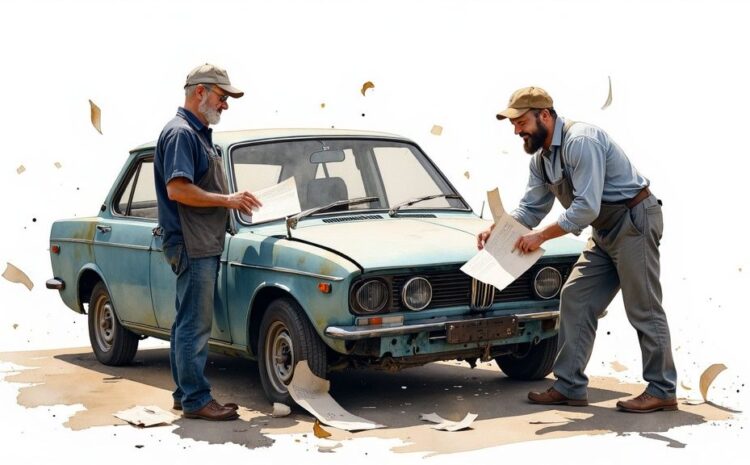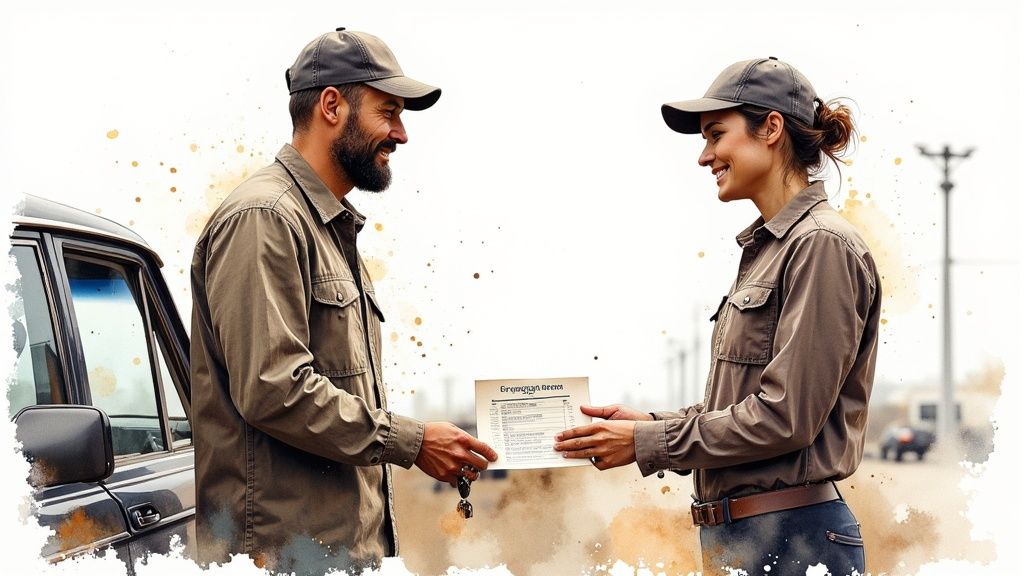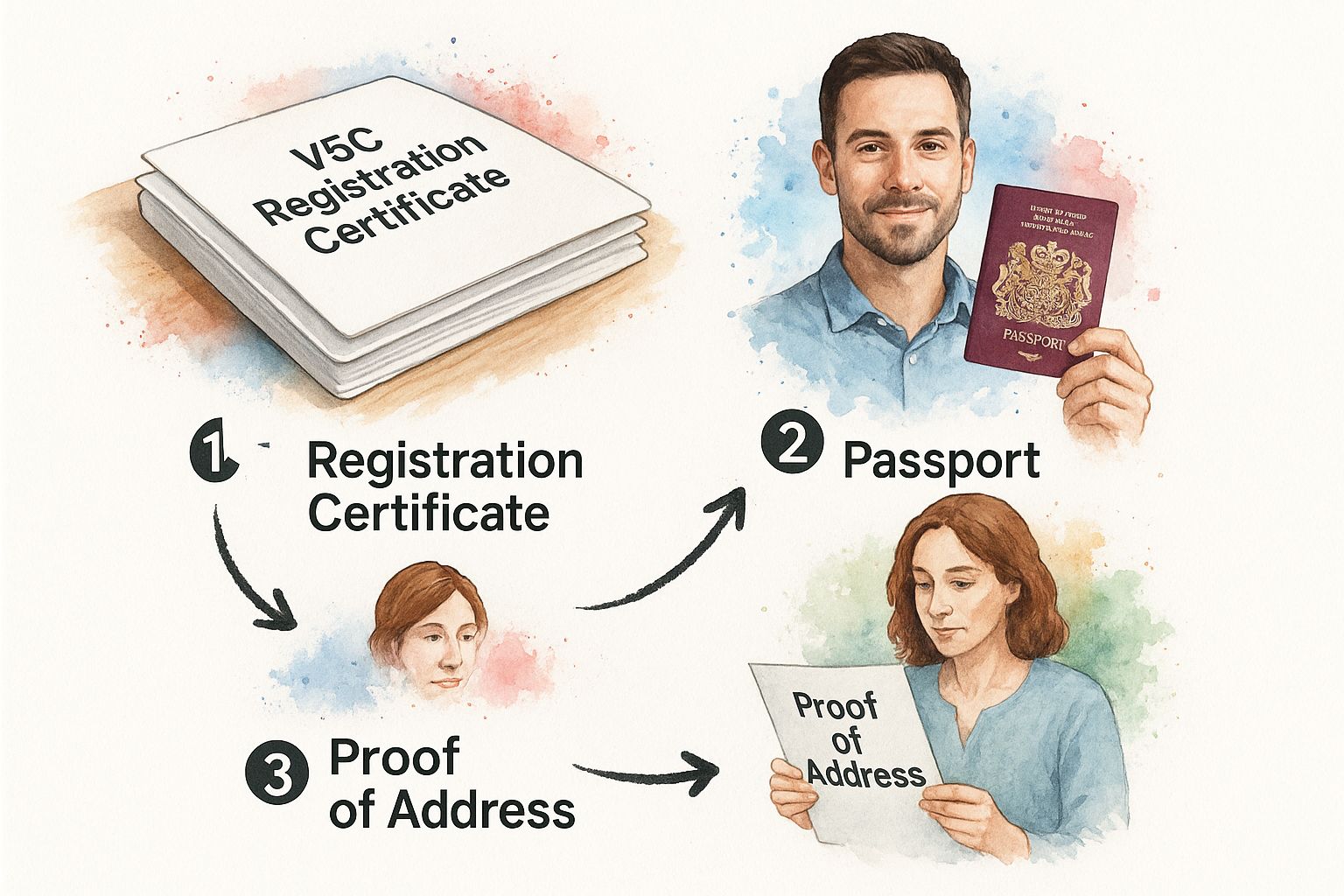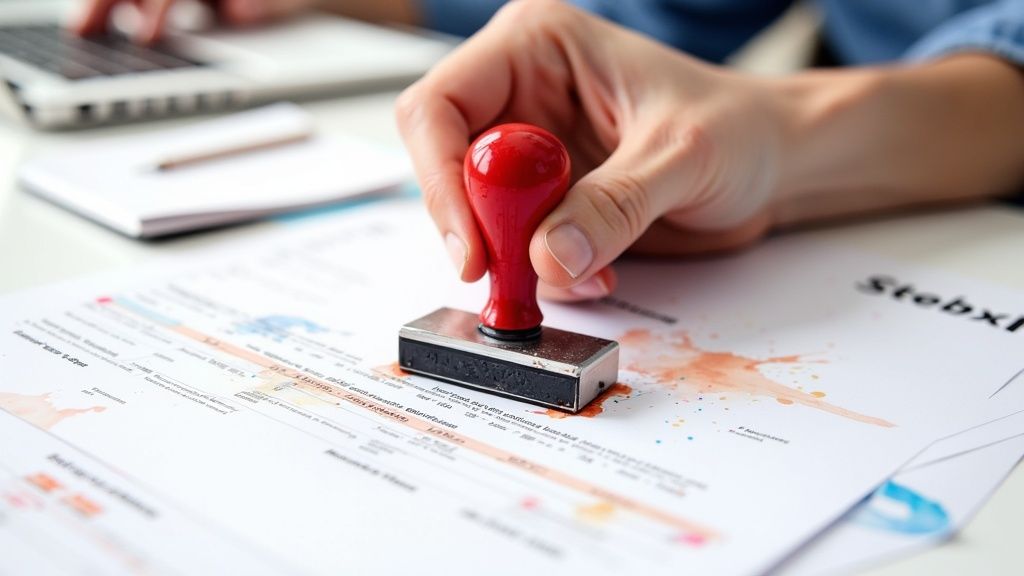
Scrapping a Car in Feltham? Here’s What Paperwork You Need?
When it's time to scrap your car in Feltham, the first thing on your mind should be the paperwork. It might sound like a chore, but getting your documents in order is the most crucial step to ensure everything is legal, smooth, and hassle-free.
So, what do you actually need? For the most part, it boils down to two key items: your V5C registration certificate (often just called the logbook) and a valid photo ID.
Your Essential Car Scrappage Paperwork Checklist

Before you even think about calling an Authorised Treatment Facility (ATF) in Feltham, it’s a smart move to gather these bits and pieces. Having everything ready to go not only makes the whole thing quicker but also protects you from any legal headaches later on.
The system is really all about two things: proving you're the car's legal owner and making sure the Driver and Vehicle Licensing Agency (DVLA) knows you've passed it on. This isn't just good practice—it's a legal requirement. Skipping this step could land you with an unexpected fine.
The Two Documents You Absolutely Need
First and foremost, you need to find that V5C logbook. This is the single most important document in the whole process. It holds all the key details about your vehicle and officially ties it to you as the owner. While it's possible to scrap a car without one, it definitely makes things more complicated.
The second non-negotiable item is a valid photo ID. Thanks to the Scrap Metal Dealers Act of 2013, every scrap yard is legally required to check and verify the identity of the person selling the car. This law was brought in to combat vehicle theft and makes sure all transactions are above board. A driving licence or passport will do the job perfectly.
To make things crystal clear, here’s a quick summary of what you'll need.
Quick Checklist for Scrapping Your Car
| Document | Why It Is Essential | What to Do With It |
|---|---|---|
| V5C Logbook | Proves you are the legal, registered keeper of the vehicle. | Hand it over to the ATF but keep the yellow slip (Section 9 for older versions, Section 4 for newer ones) to send to the DVLA. |
| Photo ID | A legal requirement under the Scrap Metal Dealers Act 2013 to verify your identity. | Show it to the scrap yard staff so they can take a copy for their records. A driving licence or passport is ideal. |
Having these items ready will ensure your experience is straightforward and you can get your Certificate of Destruction without any delays.
Think of it this way: when London's ULEZ scrappage scheme was in full swing, over 54,716 applications were approved. A huge part of that success was people having their V5C details correct and ready to go. It just goes to show how vital the official process is.
If you want a full walkthrough of the entire journey from start to finish, be sure to check out our complete guide on how to scrap your car. It covers everything you need to know.
Getting the V5C Logbook Sorted
When it comes to scrapping your car in Feltham, the most important bit of paper you'll need is the V5C registration certificate, better known as the logbook. It’s essentially your car's passport, proving you're the registered keeper. Without it, things can get tricky.
You don’t just hand over the whole book to the scrap dealer. Your job is to deal with a specific tear-off slip.
If you have a newer V5C (anything issued after April 2019), you’re looking for the yellow Section 4 slip. Its title is pretty clear: "Selling or transferring your vehicle to a motor trader, insurer or dismantler". For older logbooks, the one you need is the blue Section 9.
Filling Out Your Section of the V5C
Getting this small section right is crucial. You’ll need to write down the full business name and address of the Authorised Treatment Facility (ATF) taking your car. Don't forget to put the exact date of the handover.
Once that's done, you sign your part, the ATF signs theirs, and then you tear it off. This little slip is for you to send to the DVLA. The scrap yard will take the rest of the logbook off your hands.
This infographic breaks down the essential documents you'll need for the whole process.

As you can see, it really boils down to having your V5C, some photo ID, and proof of address. Get these three sorted, and you're set for a hassle-free experience.
Expert Tip: Never, ever hand over the entire V5C logbook without tearing off your completed section first. That slip is your proof that you’ve transferred the vehicle. It protects you from any potential fines or tickets until the official Certificate of Destruction lands on your doormat.
What if I Can't Find My V5C?
It happens more often than you’d think. You've decided to scrap the car, but the V5C has vanished. Don't worry, it's not a deal-breaker. You can still scrap your car in Feltham, it just means a slightly different process.
Any good ATF will usually take the car without a logbook, as long as you can prove you own it another way. This typically involves showing them:
- A valid photo ID (your driving licence or passport is perfect).
- A recent utility bill or bank statement with your name and current address.
The main difference is that the responsibility for telling the DVLA is now entirely down to you. You'll need to write and post a letter to the DVLA yourself.
In your letter, make it clear that you've sold the vehicle to a scrap dealer. You must include your full details, the car's registration number, its make and model, the exact date of the sale, and the full name and address of the ATF that took it. This is your way of officially washing your hands of the vehicle and making sure you're no longer legally responsible for it.
Ticking the Boxes: Your Legal Duties with the DVLA

Once the Authorised Treatment Facility (ATF) has collected your car, you've got one last crucial bit of admin to do. It’s not just a suggestion—it’s a legal requirement that shields you from any future penalties tied to a vehicle you no longer own. You have to officially tell the DVLA you've scrapped it.
Luckily, there are two simple ways to get this done. The fastest route is to notify the DVLA online. You’ll just need the 11-digit reference number from the yellow slip of your V5C (that's Section 4 or 9). The online service runs from 7 am to 7 pm and gives you immediate confirmation, so you know it's sorted.
If you prefer the old-school approach, you can handle it by post. Just tear off that completed and signed yellow slip and send it directly to the DVLA in Swansea. It works just as well, but obviously, you need to factor in the time it'll take to get there. Whichever way you go, this is the step that formally ends your responsibility for the vehicle.
The All-Important Certificate of Destruction
Within seven days of your car being scrapped, the ATF is required by law to give you a Certificate of Destruction (CoD). Honestly, this is the most vital piece of paper you'll get back in the whole process.
Think of the CoD as your official, legally binding receipt. It proves your car has been properly taken off the road and recycled according to environmental laws. More importantly, it tells the DVLA the vehicle is gone for good, and you're no longer responsible for it. This is what protects you from any future road tax demands, speeding fines, or abandonment penalties linked to that registration plate.
Key Takeaway: Never walk away without ensuring you'll receive a copy of the Certificate of Destruction. When you get it, file it away somewhere safe. If you don't get confirmation from the DVLA within four weeks, it's time to chase up both the ATF and the DVLA.
The UK's scrappage regulations have tightened up over the years, particularly after the big 2009 scrappage scheme which really drove home the need for a solid paper trail. If you're interested, you can find out more about how these schemes evolved and shaped the procedures we follow today.
Also, a quick note: if you’ve already declared your car as off the road with a SORN, the process has a few extra considerations. We cover everything you need to know in our detailed guide on how to SORN your vehicle.
Choosing a Reputable Scrapyard in Feltham
Got your paperwork sorted? Great. Now comes a crucial decision: where to actually scrap your car. This isn't just about getting the best price; it's about making sure the job is done legally and responsibly.
To get that all-important Certificate of Destruction (CoD), you absolutely must use a government-approved Authorised Treatment Facility (ATF). Think of an ATF as a scrapyard with an official seal of approval from the Environment Agency. This licence guarantees they have the right gear to safely drain all the nasty fluids and recycle everything properly, protecting the local environment.
Going with an unlicensed operator is a big risk. Not only could your car end up polluting something, but you might find yourself still legally on the hook for it.
How to Spot a Legit Feltham ATF
A few minutes of checking now can save you a world of headaches later. The simplest way to see if a local scrapyard is above board is to look them up on the Environment Agency's public register. It's a straightforward online database that lists every licensed ATF in the country.
When you're on the phone with a potential scrap company, keep your ears open for a few tell-tale red flags:
- "We pay cash." This is a big one. Thanks to the Scrap Metal Dealers Act 2013, paying cash for a scrap car is illegal. Payment must be made by a traceable method like a bank transfer or a cheque.
- Being dodgy about the CoD. Any genuine ATF knows the Certificate of Destruction is essential. If they brush off your questions about it, walk away.
- No proper address. A real business will have a physical yard and a landline. If you're only dealing with a mobile number and a vague promise, be very cautious.
A Quick Word of Warning: Only a licensed ATF can issue a Certificate of Destruction. Without it, the DVLA will never know you've scrapped the car. That means you could still be liable for fines, taxes, and anything else related to the vehicle, long after you think it's gone.
Taking the time to find a reliable partner makes the whole process smooth and worry-free. For instance, specialist services know the ins and outs of the law and only work with licensed facilities. If you want to see what a professional, fully compliant service looks like, you can check out the options for scrapping a car in Feltham and rest assured you're in safe hands.
What About Scrapping an Electric or Hybrid Car?
As more electric and hybrid vehicles pop up around Feltham, the process for scrapping them has a few extra wrinkles. The usual paperwork, like your V5C logbook, is still a must-have, but the real focus shifts to the car's high-voltage battery.
It’s not just a box of metal anymore. Authorised Treatment Facilities (ATFs) are legally bound to handle these powerful batteries with specialist care, thanks to strict safety and environmental rules. So, don't be surprised if they ask for a bit more information about your EV or hybrid's battery. It’s not about creating hassle; it’s about making sure that powerful component is handled and recycled safely.
Why They Need to Know About the Battery
When you call an ATF in Feltham, one of the first things they'll likely ask is about the battery's condition. Has it been in a knock? Is it working perfectly, or has it been removed altogether? Knowing this is absolutely vital for their safety procedures.
Here’s the sort of information that will help them out:
- Battery Health Report: If you have one from a recent service, it’s golden.
- Service History: This gives them a good idea of the battery's age and general condition over time.
- Accident History: Any information about collisions is critical. A damaged battery isn't just broken; it can be a serious fire risk.
This isn't just pointless paperwork. This information allows the ATF to follow precise protocols for dismantling the vehicle and making it safe, ensuring that none of the hazardous materials inside the battery ends up where it shouldn't.
Getting rid of an old EV is a whole different ball game to scrapping a petrol car. That battery is both the most valuable and the most dangerous part of the vehicle. Giving the ATF clear info helps them do their job properly and ensures you've met all your environmental responsibilities.
The UK's entire car scrappage industry is adapting to handle this new wave of vehicles. For anyone scrapping an EV in Feltham, this means your paperwork should ideally paint a clear picture of the battery's health. For a deeper dive, you can find out more about how electric vehicles are reshaping the industry on scrapcarnetwork.org.
Got Questions About Car Scrapping Paperwork? You're Not Alone.
It's completely normal to have a few questions when you're sorting out the paperwork to scrap your car in Feltham. The rules can seem a bit tricky at first, but a bit of clarity can make the whole process feel much less daunting.
We get asked these all the time, so here are the straightforward answers you need.
What If I Can't Find My V5C Logbook?
Don't panic – it's still possible to scrap your car, it just means you have one small extra job to do. While handing over the V5C is the standard way, any trustworthy Authorised Treatment Facility (ATF) will still take your vehicle as long as you can prove you're the owner.
All you'll need is your valid photo ID (a driving licence or passport works perfectly) and a recent utility bill to confirm your address.
The main thing to remember is that you now need to tell the DVLA the car has been sold for scrap. Simply write them a letter that includes:
- Your name and address
- The car's registration number, make, and model
- The exact date you sold it for scrap
- The name and address of the ATF that took the vehicle
Sending this letter ensures you’ve officially passed on responsibility for the car.
How Long Does the Certificate of Destruction Take to Arrive?
The ATF has a legal obligation to issue a Certificate of Destruction (CoD) within seven days of taking your vehicle. They send this information directly to the DVLA electronically, taking that task off your plate.
After that, you should get a confirmation letter or email from the DVLA themselves within four weeks, confirming you're no longer the registered keeper.
A Quick Tip From Experience: If a month goes by and you haven't heard from the DVLA, it's time to be proactive. Give both the ATF and the DVLA a quick call to chase it up. It’s always better to double-check that the paperwork has gone through correctly to avoid any future headaches.
Here at Fast Scrap Car, we believe in making things simple and clear. If any other questions pop up or you're ready to get a quote, visit us online for a straightforward experience.
